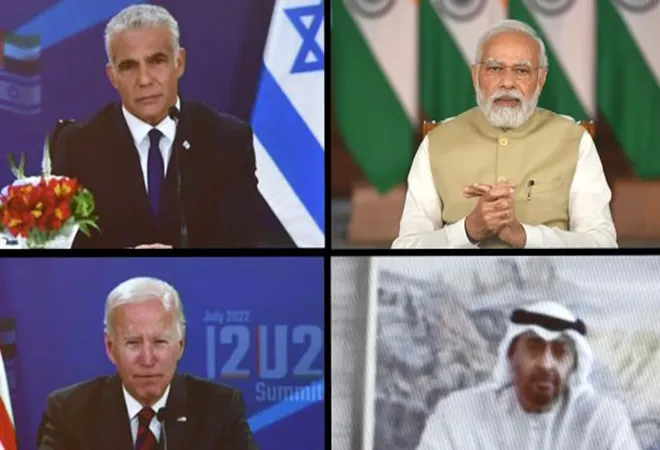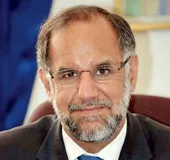COINCIDING with President Biden’s visit to Israel, the first virtual summit of the curiously named I2U2 on July 14 gives undoubted heft to a new group that brings India together with Israel, the US and the UAE. The emergence of this new quartet in West Asia last year had been greeted with raised eyebrows by some observers who queried its purpose and asked if it was aimed at deterring Chinese or Iranian ambitions in the region. The scepticism may have been due to the relatively unexpected virtual meeting of the four foreign ministers on October 18, 2021, during External Affairs Minister Jaishankar’s visit to Israel or due to the paucity of hard information about the agenda and purpose of the new grouping.
Some clarity could have emerged during the proposed in-person meeting of the foreign ministers on the sidelines of the Dubai Expo earlier this year but the meeting could not take place and this only fuelled speculation about the group's raison d’etre.
The four nations intend to mobilise private sector capital, technology and expertise that would help modernise the infrastructure, create low-carbon development pathways for industry, improve public health and promote the development of critical emerging and green technologies.
However, the July 14 summit makes it clear that I2U2 is developing an expansive economic agenda with an initial focus on joint investments in six specific sectors — water, energy, transportation, space, health, and food security. The four nations intend to mobilise private sector capital, technology and expertise that would help modernise the infrastructure, create low-carbon development pathways for industry, improve public health and promote the development of critical emerging and green technologies.
The distinctly economic orientation of I2U2 is reflected in the fact that the designated sherpa from India is the Secretary (Economic Relations) in the Ministry of External Affairs and the sous sherpa is the Joint Secretary heading the Economic Division. This is also true for the other sherpas — Jose W Fernandez, Under Secretary for Economic Growth, Energy, and the Environment, from the US; Ahmed Alsayegh, Minister of State in the foreign office in the UAE, and Ambassador Alon Ushpiz, DG at Israel’s Ministry of Foreign Affairs.
Over the last few months, the sherpas have had five meetings, supplemented by interactions between other senior officials and industry representatives to give a concrete shape to the two ambitious projects related to food security and clean energy. India has a strategic partnership with each of the three countries and will emerge as an early beneficiary from both projects.
The food security project envisages an investment of $2 billion by a UAE sovereign fund to develop a network of integrated food parks across the states of Gujarat and Madhya Pradesh. Companies from the US and Israel will offer innovative solutions. The programme will incorporate climate-smart technologies that help in reducing food wastage, conserving fresh water and using renewable energy. India will provide the land for the project, which will be driven by private sector companies that already have an expertise in this sector. Israel will provide advanced hydroponics technology that is likely to be deployed with an initial focus on the cultivation of banana, potato, rice, spices and onion.
The food security project envisages an investment of $2 billion by a UAE sovereign fund to develop a network of integrated food parks across the states of Gujarat and Madhya Pradesh.
It is significant that the project doesn’t stop with growing more food. It may impart a new dimension to the India-UAE food corridor project that has been under discussion between the two countries for several years and had started to take a concrete shape when an MoU was signed in February 2022 between APEDA from India and DP World and Al Dahra from the UAE on the sidelines of the virtual summit between PM Modi and now UAE President Sheikh Mohammed bin Zayed.
The food corridor aspect is particularly important for food security in the Gulf countries and even within South Asia. Towards this end, the project includes a review of trade barriers, harmonisation of food safety and quality standards and the establishment of benchmarks for transport and logistics related to perishable foodstuff so that it can create a seamless flow of food products from India to the UAE and other countries in the Gulf. There is also likelihood that India will join the US, the UAE and Israel in their Agriculture Innovation Mission for Climate Initiative.
The clean energy project envisages a hybrid renewable energy facility that brings together wind and solar energy with advanced battery storage technology. A feasibility study funded by the US Trade Development Authority has already been completed. The project would be carried out in Dwarka, Gujarat, with an investment of $330 million and involve 200 MW of wind and 100 MW of solar power, with accompanying battery storage of 100 to 500 MW capacity. UAE-based companies are expected to come on board as critical capital and technology providers. The participation of US and Israeli players offers the possibility of making India a global hub for alternate supply chains in the renewable energy sector that could reduce the prevailing dependence on China.
Beyond these two specific projects, I2U2 will also look to mobilising private capital and technical expertise in other areas that are important from an Indian perspective, including waste treatment, public health and the establishment of connections among start-ups. India, from its side, will be keen to leverage its successful experience with UPI and the fintech sector.
A feasibility study funded by the US Trade Development Authority has already been completed.
The emergence of this new grouping is clearly an outcome of the Abraham Accords of August 2020 and the possibilities that they have created for Israel and the UAE to be on the same platform with India and the US. As President Biden moves to Saudi Arabia for the second leg of his visit to West Asia and his meeting with nine leaders from the region, we are likely to see a more active push towards integrating Israel through trade, technology, direct flights and people-to-people contact even with countries where full diplomatic ties may take some time to mature.
Indian diplomacy, on its part, has been remarkably nimble in identifying the new opportunities and grasping them with both hands. The location of the two ambitious projects within India is evidence of the benefits of engaging pragmatically across the emerging platforms.
This commentary originally appeared in The Tribune.
The views expressed above belong to the author(s). ORF research and analyses now available on Telegram! Click here to access our curated content — blogs, longforms and interviews.




 PREV
PREV


